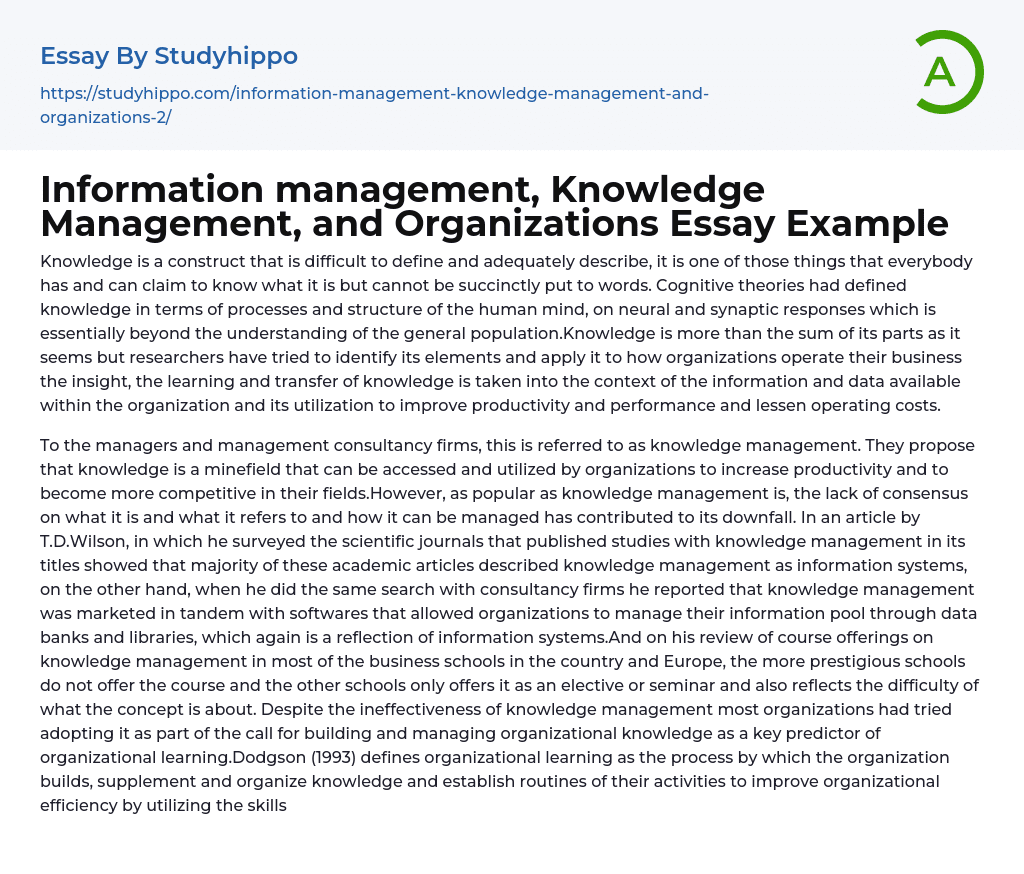

Information management, Knowledge Management, and Organizations Essay Example
Defining and describing knowledge is a challenging endeavor as it is not easily expressed, despite being inherent in everyone. Cognitive theories have attempted to comprehend knowledge through the mechanisms and arrangement of the human mind, such as neural and synaptic responses, which many individuals struggle to grasp. Nevertheless, scholars have endeavored to recognize the components of knowledge and implement them within organizational procedures. This encompasses acquiring understanding, acquiring new skills or information, and transmitting knowledge utilizing the organization's information and data. The utilization of this knowledge strives to enhance productivity, elevate performance levels, and diminish operating costs.
The concept of "knowledge management" is widely used by managers and management consultancy firms to refer to the process of utilizing knowledge within organizations for increased productivity and competitiveness. However, there is no consensus on how to define and manage knowledge
..., which has led to its decline. Academic journals often view knowledge management as information systems, while consultancy firms market it as software tools for managing information. This association with information systems can also be seen in business schools, where prestigious institutions do not offer dedicated knowledge management courses and others only offer it as an elective or seminar. This highlights the challenge in grasping the concept of knowledge management.
Some organizations have attempted to adopt knowledge management as a means of building and managing organizational knowledge and improving organizational learning. Organizational learning refers to the process through which organizations develop, supplement, and organize knowledge while establishing routines that enhance efficiency using their workforce's skills (Dodgson, 1993). On the one hand, organizational knowledge encompasses both implicit and explicit knowledge that employees possess and use to perform their tasks effectively (Davenport
DeLong & Beers, 1998). The core idea of organizational learning is to understand and leverage the vast amount of information within the company.However, organizational knowledge pertains specifically to the expertise and know-how of employees that is gained through their experience working within the company.
Management consultancy firms propose that organizational knowledge should be utilized and that knowledge management should be implemented to offer employees learning opportunities within the organization. However, the connection between organizational learning, organizational knowledge, and knowledge management is flawed. Instead of concentrating on managing knowledge to improve organizational learning, it is crucial to comprehend the notion of knowledge itself. Defining knowledge is challenging, as emphasized in T. D. Wilson's (2002) article. Moreover, the idea of organizational knowledge and organizational learning appears reasonable but lacks credibility when assessing its influence on employee performance and company productivity.
In summary, the argument is that organizations cannot possess knowledge because knowledge is intangible and instead, they manage information. The idea is that if all employees have knowledge, then the organization is comprised of interconnected knowledges. By creating a community of learners and encouraging knowledge-sharing, employees can become knowledgeable about each other's tasks and expertise. However, this may not necessarily enhance their own specialization. Additionally, it is important to consider that organizations are composed of different departments, making it unlikely for one department to learn from another. Ultimately, what organizations manage is information, as it can be written, coded, systematized, and organized. As a result, many management consultants provide methods for organizing already-existing information within companies under the guise of knowledge management.
References:
- Davenport, T. , DeLong, D. , & Beers,
M. (1998).
net/ir/8-1/paper144.html].
- Interpretation essays
- Plagiarism essays
- Analogy essays
- Learning English essays
- Accident essays
- Awareness essays
- Benefits of Volunteering essays
- Challenges essays
- Childhood Memories essays
- Decision essays
- Driving essays
- Event essays
- Excellence essays
- Expectations essays
- Failure essays
- Farewell essays
- Flight essays
- Gift essays
- Growing Up essays
- Ignorance essays
- Improve essays
- Incident essays
- Knowledge essays
- Luck essays
- Memories essays
- Mistake essays
- Obstacles essays
- Overcoming Challenges essays
- Party essays
- Peace Corps essays
- Personal Experience essays
- Problems essays
- Sacrifices essays
- Struggle essays
- Success essays
- Trust essays
- Vacation essays
- Visit essays
- Volunteering essays
- Coaching essays
- Critical Thinking essays
- homework essays
- Learning essays
- Library essays
- Listening essays
- Literacy essays
- Mentor essays
- Physical Education essays
- Project essays
- Reading essays



